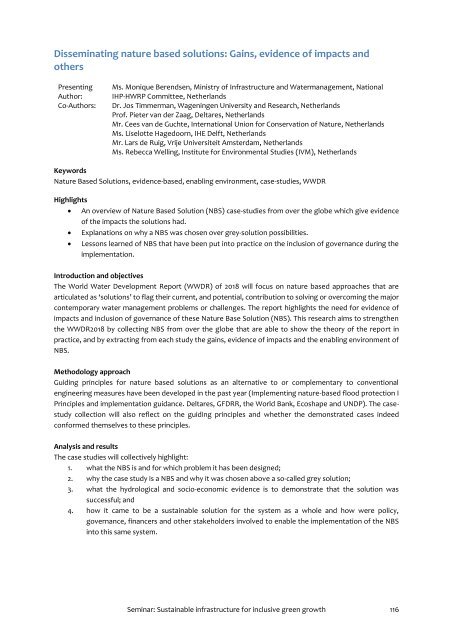2018 Abstract Volume
A compilation of the oral and written scientific presentations chosen to be part of World Water Week 2018 Seminars.
A compilation of the oral and written scientific presentations chosen to be part of World Water Week 2018 Seminars.
Create successful ePaper yourself
Turn your PDF publications into a flip-book with our unique Google optimized e-Paper software.
Disseminating nature based solutions: Gains, evidence of impacts and<br />
others<br />
Presenting<br />
Author:<br />
Co-Authors:<br />
Ms. Monique Berendsen, Ministry of Infrastructure and Watermanagement, National<br />
IHP-HWRP Committee, Netherlands<br />
Dr. Jos Timmerman, Wageningen University and Research, Netherlands<br />
Prof. Pieter van der Zaag, Deltares, Netherlands<br />
Mr. Cees van de Guchte, International Union for Conservation of Nature, Netherlands<br />
Ms. Liselotte Hagedoorn, IHE Delft, Netherlands<br />
Mr. Lars de Ruig, Vrije Universiteit Amsterdam, Netherlands<br />
Ms. Rebecca Welling, Institute for Environmental Studies (IVM), Netherlands<br />
Keywords<br />
Nature Based Solutions, evidence-based, enabling environment, case-studies, WWDR<br />
Highlights<br />
• An overview of Nature Based Solution (NBS) case-studies from over the globe which give evidence<br />
of the impacts the solutions had.<br />
• Explanations on why a NBS was chosen over grey-solution possibilities.<br />
• Lessons learned of NBS that have been put into practice on the inclusion of governance during the<br />
implementation.<br />
Introduction and objectives<br />
The World Water Development Report (WWDR) of <strong>2018</strong> will focus on nature based approaches that are<br />
articulated as ‘solutions’ to flag their current, and potential, contribution to solving or overcoming the major<br />
contemporary water management problems or challenges. The report highlights the need for evidence of<br />
impacts and inclusion of governance of these Nature Base Solution (NBS). This research aims to strengthen<br />
the WWDR<strong>2018</strong> by collecting NBS from over the globe that are able to show the theory of the report in<br />
practice, and by extracting from each study the gains, evidence of impacts and the enabling environment of<br />
NBS.<br />
Methodology approach<br />
Guiding principles for nature based solutions as an alternative to or complementary to conventional<br />
engineering measures have been developed in the past year (Implementing nature-based flood protection I<br />
Principles and implementation guidance. Deltares, GFDRR, the World Bank, Ecoshape and UNDP). The casestudy<br />
collection will also reflect on the guiding principles and whether the demonstrated cases indeed<br />
conformed themselves to these principles.<br />
Analysis and results<br />
The case studies will collectively highlight:<br />
1. what the NBS is and for which problem it has been designed;<br />
2. why the case study is a NBS and why it was chosen above a so-called grey solution;<br />
3. what the hydrological and socio-economic evidence is to demonstrate that the solution was<br />
successful; and<br />
4. how it came to be a sustainable solution for the system as a whole and how were policy,<br />
governance, financers and other stakeholders involved to enable the implementation of the NBS<br />
into this same system.<br />
Seminar: Sustainable infrastructure for inclusive green growth 116


















